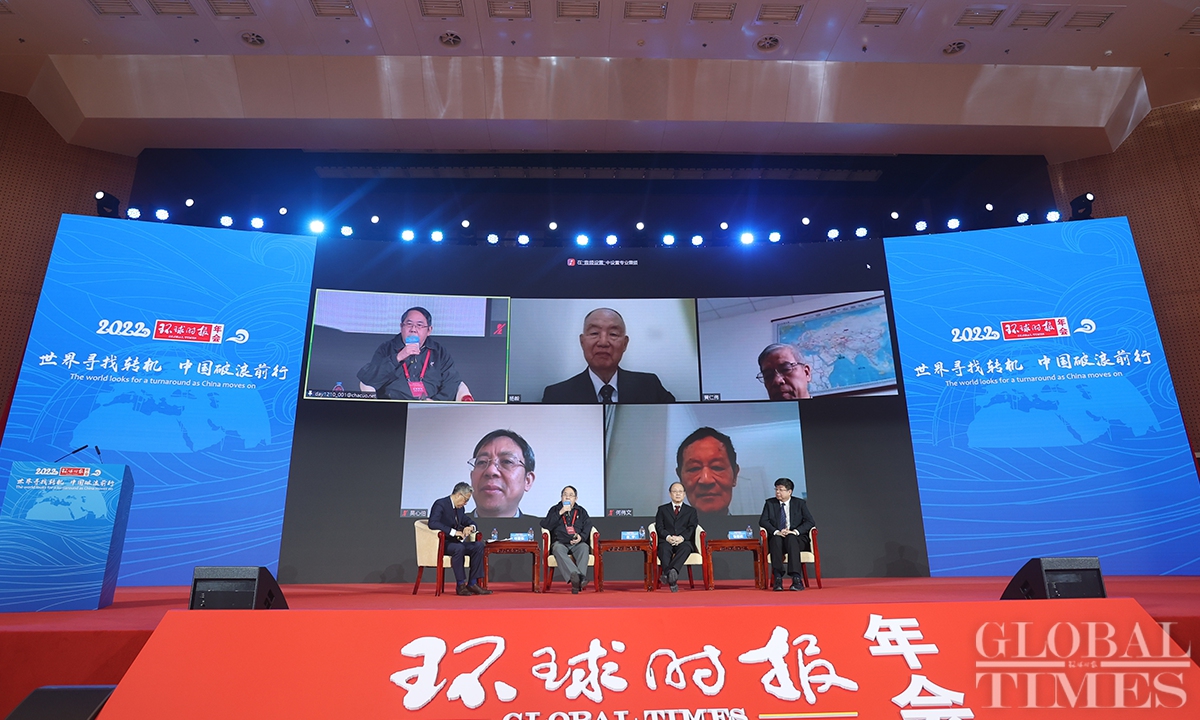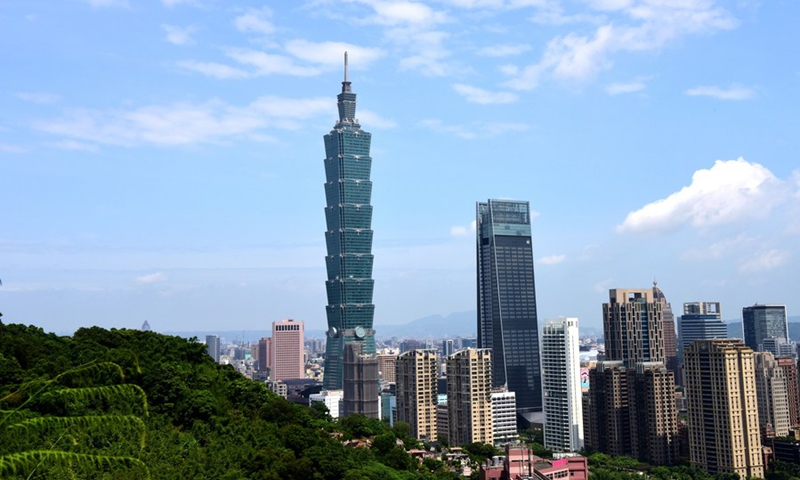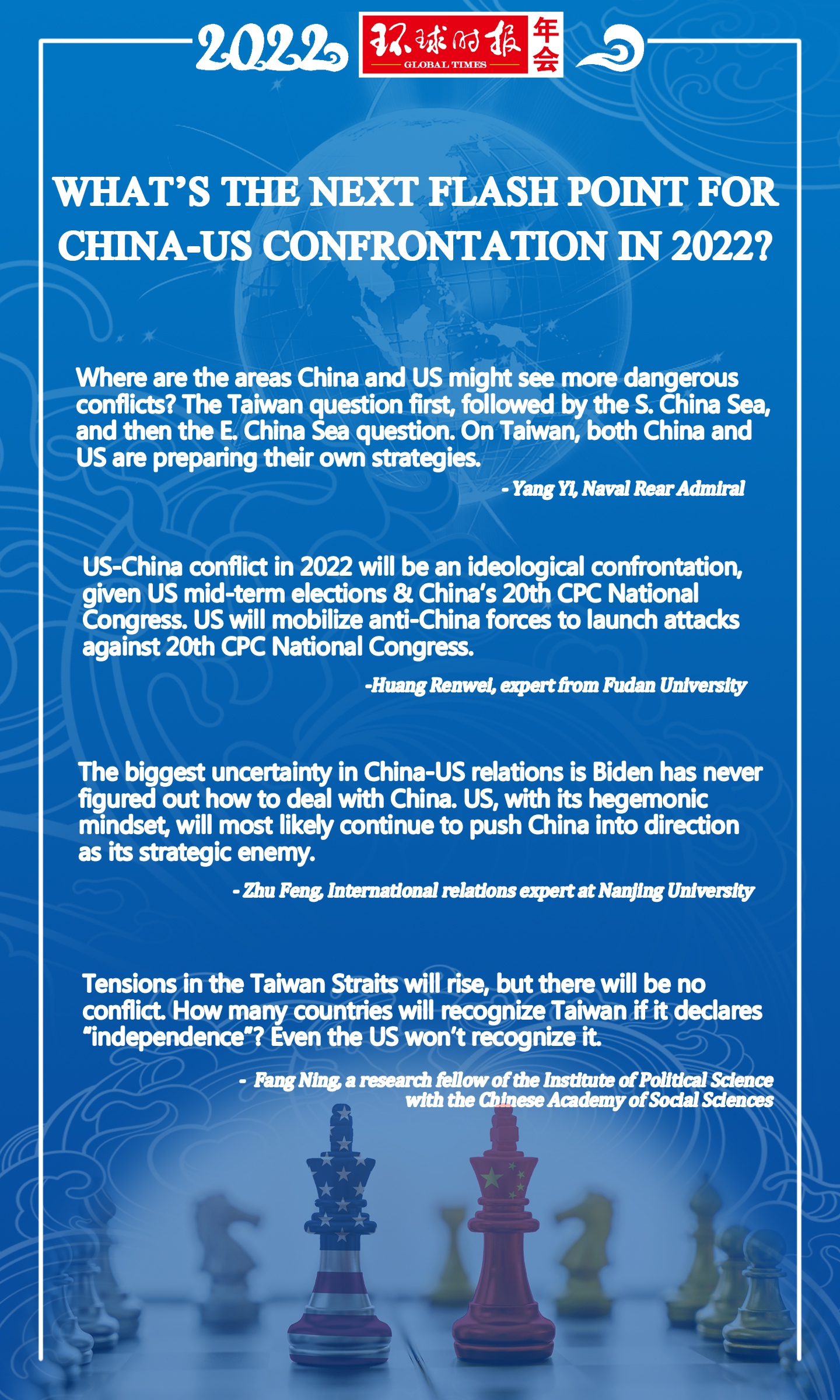
Photo: Cui Meng/GT
The Taiwan question will be the top issue of concern between China and the US for 2022, Chinese experts said at the Global Times Annual Forum on Saturday. Some experts said that the Biden administration lacks confidence in facing the rise of China and does not believe in goodwill from China.
"If we rank the major points that could cause dangerous conflicts between China and the US in the future, I would say the Taiwan question would be the first and then comes the South China Sea and the East China Sea," Naval Rear Admiral Yang Yi said at the forum.
"On the Taiwan question, both China and the US have been preparing in terms of planning and strength," he said, noting that if a strategic accident leads to conflict, as major powers, the two countries won't easily make any compromises out of national pride.
The Biden administration has been escalating provocations on the Taiwan question over the past year. For example, it not only allowed senior US officials like US Secretary of State Anthony Blinken to adopt aggressive rhetoric recently such as "any move by China to 'invade' Taiwan would have terrible consequences," and some US politicians have wantonly challenged the one-China principle by visiting the island or supporting the secessionist DPP authority.
Most experts who attended the first panel of the Global Times Annual Forum said that they believe the intense situation surrounding the Taiwan Straits will develop the most rapidly.
"My major concern for next year will be the Taiwan Straits, as we can see the Biden administration has made a comprehensive adjustment on its policy concerning the island," as it has comprehensively upgraded its engagement with the island," Wu Xinbo, dean of the Institute of International Studies at Fudan University, said at the summit.

Photo taken on July 21, 2019 from Xiangshan Mountain shows the Taipei 101 skyscraper in Taipei, southeast China's Taiwan. (Xinhua/Zhu Xiang)
Currently, the relationship between the US and the island of Taiwan is going forward in many areas, be they diplomatic, military or economy, Wu said, noting that what we should pay special attention to is the military area as senior US military staff have been hyping the idea that China will seek to resolve the Taiwan question in the upcoming six years and Washington has ratcheted up its military support to Taiwan and escalated its military deterrence toward the Chinese mainland.
"Such deterrence signals a possibility that the US and mainland armies have a higher chance of a confrontation in the future," he said.
Still, China and the US have seen some major breakthroughs in bilateral ties in 2021 following the extreme suppression and containment of China by the former Trump administration. The virtual meeting between the top leaders of the two countries in November was especially seen as injecting positive momentum into the relationship, helping to ease tensions and bring new hope for resuming cooperation in some fields such as trade and climate change.
"Biden's China policy tactic is to take one step forward and one step backward. Future China-US ties must be a parallel between tension and detente, improvement and confrontation," Wu said.
The US lacks confidence in the face of China's rise. It does not believe in goodwill from China, some experts said. Still, China and the US are simply too big for each other to handle if a fierce conflict breaks out and so they are bound to do all they can to manage a possible crisis, experts said at the forum.
As the two countries have many common interests when it comes to dealing with global issues and regional cooperation, including climate change and the nuclear issues in Iran and North Korea, even if the US is not willing to work with China, it still has to do so, some experts said.
"China and the US will have more frequent diplomatic and economic exchanges next year and so it is possible that trade ties will improve," said Wu. For example, the tariffs the US slapped on China are causing inflation in the US, which is more than the latter can bear.
"So the US is likely to reduce tariffs on the one hand, but it is also possible that it will add more tariffs, using Chinese government subsidies as an excuse."
On the top issue of concern, some experts said they believed that the situation concerning the Taiwan Straits may intensify in 2022.
"The US wants to create a situation that won't lead to military conflict with China over Taiwan so that it can strengthen support for Taiwan, while Taiwan will recklessly pursue "independence." But the Chinese mainland won't allow the situation to develop in that direction to the extent that US and the DPP authority in Taiwan develop the understanding that it will completely avoid military conflict with the US, Shi Yinhong, director of the Center for American Studies at Renmin University of China, told the forum.
"The US hasn't changed its stance toward China, but has instead gone further in the same direction. We also haven't changed ours. Hence, China-US relations will likely continue trending downward," Shi said.

What's the next flash point for China-US confrontation in 2022? Graphic:Xu Zihe/GT
The biggest problem in today's increasingly confrontational China-US relations is how the US defines the competition, some experts said at the summit.
"Is China a strategic rival or a strategic enemy? The US never gets it right," said Zhu Feng, international relations expert at Nanjing University.
Huang Renwei from the Fudan Institute of Belt and Road & Global Governance said that the flash point between China and US will be in ideological areas, as China is scheduled to hold the 20th CPC National Congress and the US will hold midterm elections in 2022.
Huang pointed out that the US Democratic and Republican parties will compete with each other concerning their anti-China stance, thus a wave of more intense anti-China rhetoric will be seen in the US.
Global Times






